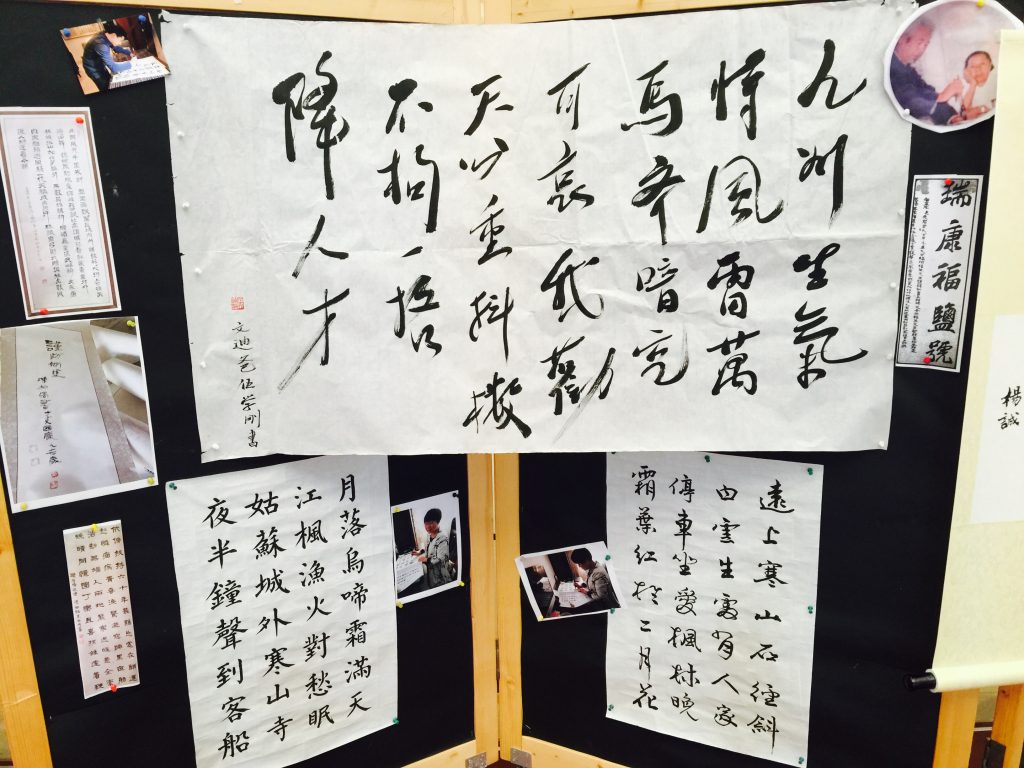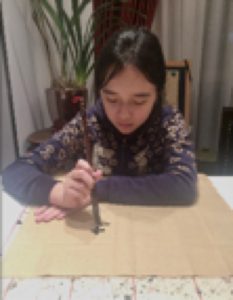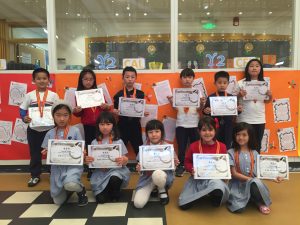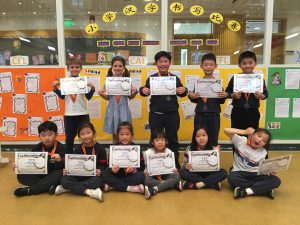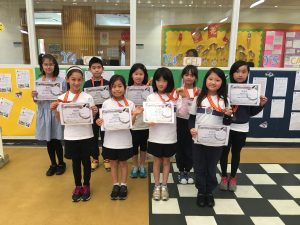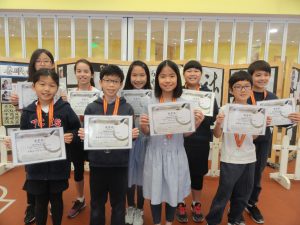By Sissy Shen (Head of Primary Chinese)
Do you know the three “superlatives” of Chinese characters?
- Chinese character is one of the most ancient texts;
- Chinese character is the oldest “living” text;
- Chinese character is currently the most used text in the world.
 Besides that, Chinese characters are also beautiful, visual, highly identified, relevant and informative. Therefore, we help children to experience the mystery and glamour Chinese character’s in recognising, reading, writing and feeling through various learning activities at YCIS.
Besides that, Chinese characters are also beautiful, visual, highly identified, relevant and informative. Therefore, we help children to experience the mystery and glamour Chinese character’s in recognising, reading, writing and feeling through various learning activities at YCIS.
If you have walked past the Courtyard at Regency Park Campus recently, it’s hard to miss all the beautiful Chinese handwriting work from our teachers, students, staff and parents. This is our annual Primary Chinese Handwriting Competition. We were surprised to see there are so many Chinese handwriting masters around us! I would like to take this opportunity to hear their opinion about handwriting and get to know them.
Interview: Mr. Alain Wu (Y4B Wendi Wu’s dad)
Question: Your calligraphy is so amazing! When did you start to learn and why?
Mr. Wu: My great grandfather Wu Jujiu was an educator and calligrapher during the period of the Republic of China. He had studied Han inscriptions for many years. Early in my hometown, he inscribed the plaques of all famous bridges, parks, pavilions, terraces and open halls. My grandfather Wu Dongbai, who started learning calligraphy at age 7, practiced every day with 500 words, until the age of 95. He insisted on practicing every day. My father began to practice calligraphy in his retirement. So I was brought up in this “calligraphy environment.” I remember first starting calligraphy in grade four or five at primary school.
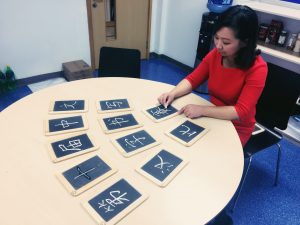 Interview: Ms. Janie Dong & Y3C Ms. Cathy Yang
Interview: Ms. Janie Dong & Y3C Ms. Cathy Yang
Question: How do teachers practice good handwriting?
Ms. Dong: To practice good handwriting is a process of honing your will. Just like when you focus on writing, nothing is important, just the story that you write.
Ms. Yang: As a Chinese teacher, handwriting is a very basic skill. When we study in Normal University, we practice our handwriting with pen, pencil or chalk every day. Slowly, it became a habit, and I really enjoyed that.
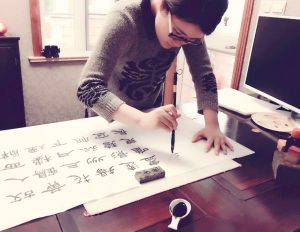
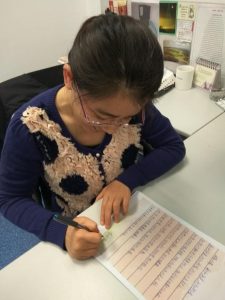 Interview: Ms. Ivy Li (Office Administrative Assistant) & Ms. Hayes Han (Supporting Division)
Interview: Ms. Ivy Li (Office Administrative Assistant) & Ms. Hayes Han (Supporting Division)
Question: What is the fun part of Chinese handwriting?
Ms. Li: Handwriting makes me feel relaxed and keeps fond memories for me.
Ms. Han: When you writing calligraphy, a sweet smell of ink greets your nose, and the characters such as dragons and snakes are powerful. The process of practicing handwriting is a good way to understand the beauty of Chinese characters from traditional to simplified.
Interview: Secondary Students Y13B Alain Wu & Y8B Sophia  Mille
Mille
Question: Why do you think we should value Chinese handwriting as a student?
Alain: I have been studying in YCIS for 16 years. I am quite satisfied with my Chinese handwriting. We should value it since your writing style is a reflection of who you are.
Sophia: I think it’s important to keep good writing habits, because Chinese characters are a part of Chinese culture; they cannot be abandoned. Calligraphy is very interesting for me, not only to better understand China’s culture and history, but also I can exercise endurance. If you want to have nice handwriting, I suggest to write official script step by step. Regular script is too complex to master at the beginning without guidance.
 Interview: Y5B Ms. Rowling Miao
Interview: Y5B Ms. Rowling Miao
Question: How long have you been teaching Chinese? In the era of rapid development of science and technology, do you think it is still valuable to use traditional pen to write? How do you support students’ handwriting?
Ms. Miao: I have been teaching Chinese for 33 years. Handwriting has an irreplaceable role in Chinese written communication, which can help students learn and use of Chinese characters. Recent findings demonstrate that writing by hand improves brain and fine motor skills. In addition, Chinese characters also have a high aesthetic value, personalized beauty and affinity. Writing Chinese characters in the Primary years helps cultivate character, enhances aesthetic awareness and also develops physical coordination, which is not possible when using digital tools such as keyboarding. When Practicing writing, students should write the characters correctly, clearly and beautifully. The ability to follow the details will determine the result. Only through being absorbed in the construction of characters can we write them well. In this way, the good habit of learning can be cultivated such as earnest, carefulness and focusing attention. Also remember to take every chance to practice handwriting.
Chinese character is a combination of culture, history stories, characters, temperament and interest.
We appreciate everyone’s enthusiasm and participation. YCIS will always spare no effort to organize more meaningful events. Last but not least, congratulation to all the award winners.


